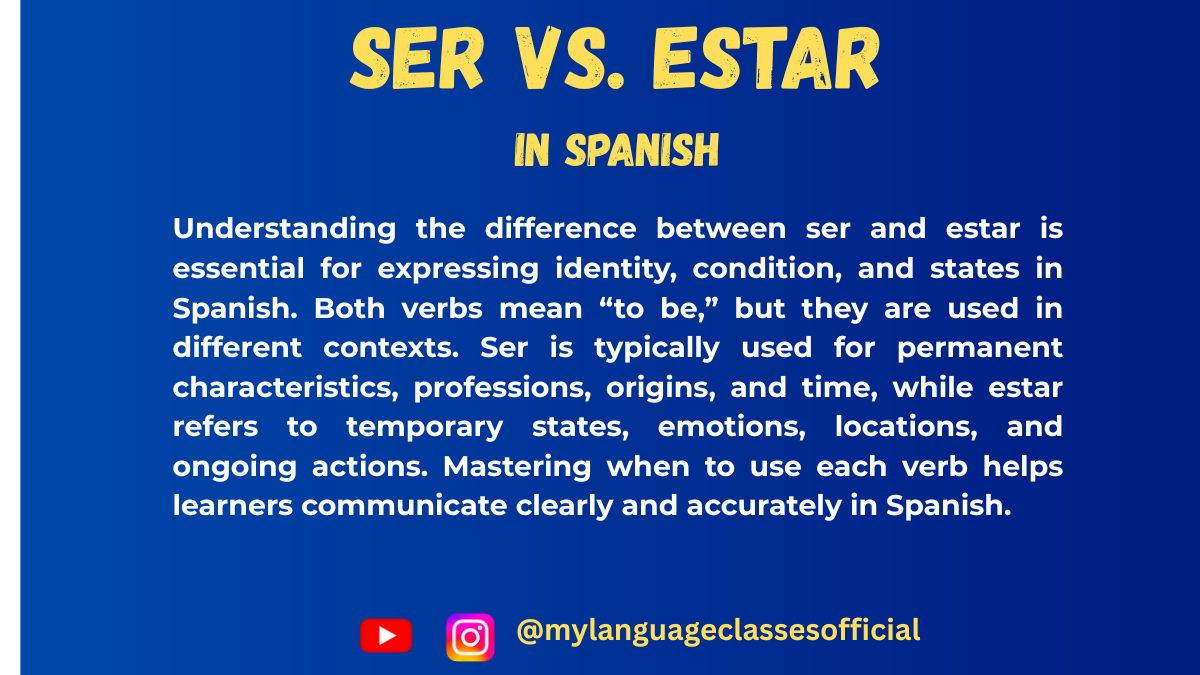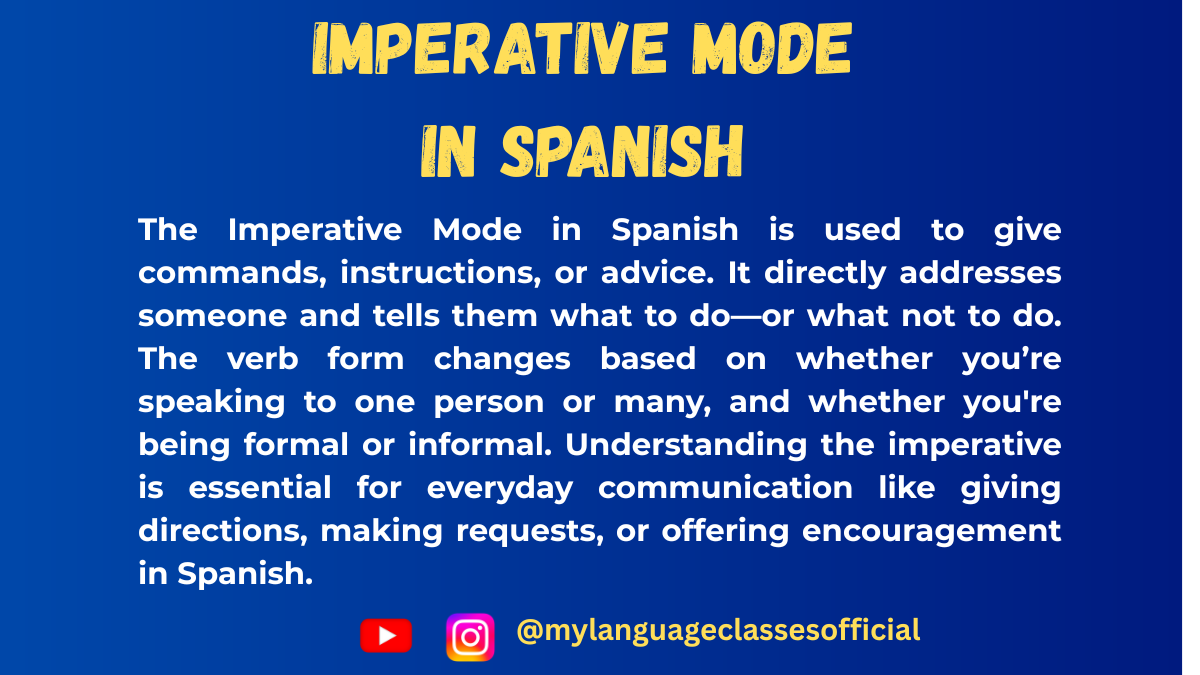Your cart is currently empty!
Category: Tenses in Spanish
Understand all Spanish verb tenses with simple explanations, conjugation charts, timelines, and practical examples. Learn how to use past, present, and future tenses in different moods like indicative, subjunctive, and imperative. Perfect for learners aiming for clear and fluent Spanish communication.
-
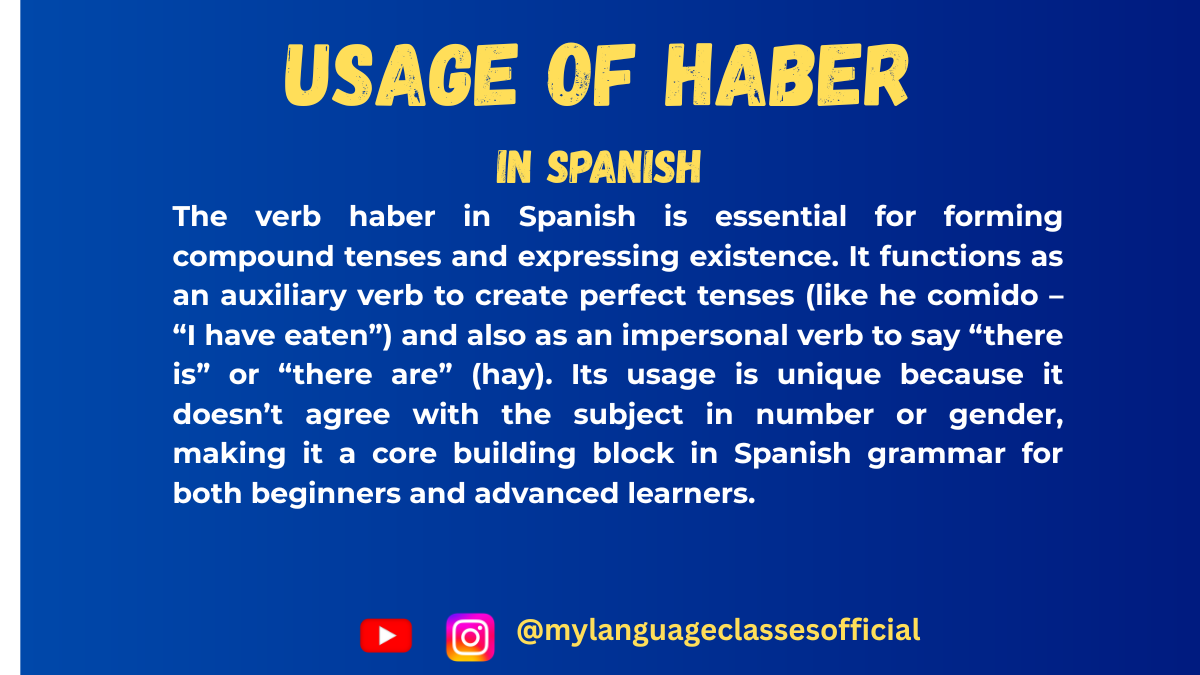
Mastering Haber in Spanish
Mastering “Haber” in Spanish
The Spanish verb haber is one of the most versatile and fundamental verbs in the language. Understanding its uses, forms, and common expressions is essential for communicating effectively in Spanish. In this blog post, we will explore the different contexts in which “haber” is used, along with a list of commonly used expressions and examples.
1. What Is “Haber”?
“Haber” is an irregular verb in Spanish that serves multiple grammatical purposes. It does not directly translate into English but has different meanings and uses depending on the context. It can function as:
- An auxiliary verb: To form compound tenses.
- An impersonal verb: To express existence.
- Part of idiomatic expressions: Used in fixed phrases common in daily speech.
2. Forms of “Haber”
The conjugation of “haber” varies greatly depending on the tense and mood. Here are some key forms:
Present tense (indicative):
- He, has, ha, hemos, habéis, han
Past tense (preterite):
- Hube, hubiste, hubo, hubimos, hubisteis, hubieron
Imperfect tense:
- Había, habías, había, habíamos, habíais, habían
Subjunctive mood (present):
- Haya, hayas, haya, hayamos, hayáis, hayan
Impersonal form (used in expressions):
- Hay (present), hubo (preterite), había (imperfect)
3. Key Uses of “Haber”
A. As an Auxiliary Verb
“Haber” is used to form compound tenses, similar to “have” in English. It combines with the past participle of the main verb.
- Present Perfect (Pretérito Perfecto): Used to talk about actions that happened in the past but are relevant to the present.
- Example: He comido. (I have eaten.)
- Past Perfect (Pluscuamperfecto): Describes actions that occurred before another past action.
- Example: Había estudiado antes del examen. (I had studied before the exam.)
- Future Perfect (Futuro Perfecto): Refers to actions that will have been completed by a certain point in the future.
- Example: Habré terminado para las cinco. (I will have finished by five.)
B. As an Impersonal Verb
“Haber” is used in its impersonal form to express existence. The subject is not a person, and it is typically followed by a noun.
- Present Tense:Hay (There is/There are)
- Example: Hay un libro en la mesa. (There is a book on the table.)
- Example: Hay muchas flores en el jardín. (There are many flowers in the garden.)
- Past Tense:
- Hubo (preterite): Refers to events or existence at a specific moment in the past.
- Example: Hubo un accidente en la carretera. (There was an accident on the road.)
- Había (imperfect): Describes an ongoing or habitual past situation.
- Example: Había mucha gente en la fiesta. (There were many people at the party.)
- Hubo (preterite): Refers to events or existence at a specific moment in the past.
- Future Tense:Habrá (There will be)
- Example: Habrá una reunión mañana. (There will be a meeting tomorrow.)
C. Common Expressions with “Haber”
Here are some of the most common idiomatic expressions with “haber,” their meanings, and example sentences:
- Hay que + infinitive
Meaning: One must/It is necessary to.- Example: Hay que estudiar para aprobar el examen. (One must study to pass the exam.)
- Haber de + infinitive
Meaning: To have to (mild obligation or future intention).- Example: He de hablar con ella. (I must talk to her.)
- Haber lugar
Meaning: To have room or to be possible.- Example: No hay lugar para más invitados. (There is no room for more guests.)
- No hay de qué
Meaning: You’re welcome (literally, there is no reason to thank).- Example: Gracias por tu ayuda. No hay de qué. (Thanks for your help. You’re welcome.)
- Haber que ver con
Meaning: To have to do with something.- Example: Eso no tiene nada que ver conmigo. (That has nothing to do with me.)
- Habérselas con alguien
Meaning: To deal with someone (often confrontational).- Example: Hoy me las he tenido que ver con mi jefe. (Today, I had to deal with my boss.)
4. Things to Keep in Mind
When using “haber,” remember the following:
Articles and Gender:
- “Haber” in its impersonal form (hay, hubo, habrá) is not influenced by the gender or plurality of the noun that follows.
- Correct: Hay una silla. (There is a chair.)
- Correct: Hay cinco sillas. (There are five chairs.)
Auxiliary Verb Agreement:
- When used as an auxiliary verb, “haber” agrees with the subject of the sentence, not the object.
- Correct: He visto la película. (I have seen the movie.)
Idiomatic Nuance:
- Expressions like hay que are impersonal and do not conjugate for different subjects.
5. Practice and Examples
To master “haber,” practice by forming sentences in different tenses and exploring idiomatic expressions. For example:
- Hay un perro en el parque. (There is a dog in the park.)
- Había una vez un rey. (Once upon a time, there was a king.)
- Habrá una gran sorpresa en la fiesta. (There will be a big surprise at the party.)
Final Thoughts
Mastering “haber” is a key step in becoming fluent in Spanish. Whether forming compound tenses, expressing existence, or using idiomatic expressions, this verb is integral to daily communication. Keep practicing, and soon, it will become second nature.
Do you have favorite expressions with “haber”? Share them in the comments!
If you found this guide helpful, I’d love to hear from you! Share your thoughts in the comments below or connect with me on social media. For more tips, resources, and inspiration, visit my blog at mylanguageclasses.in. Follow on Instagram and subscribe on YouTube
📚 Continue Learning Spanish
-
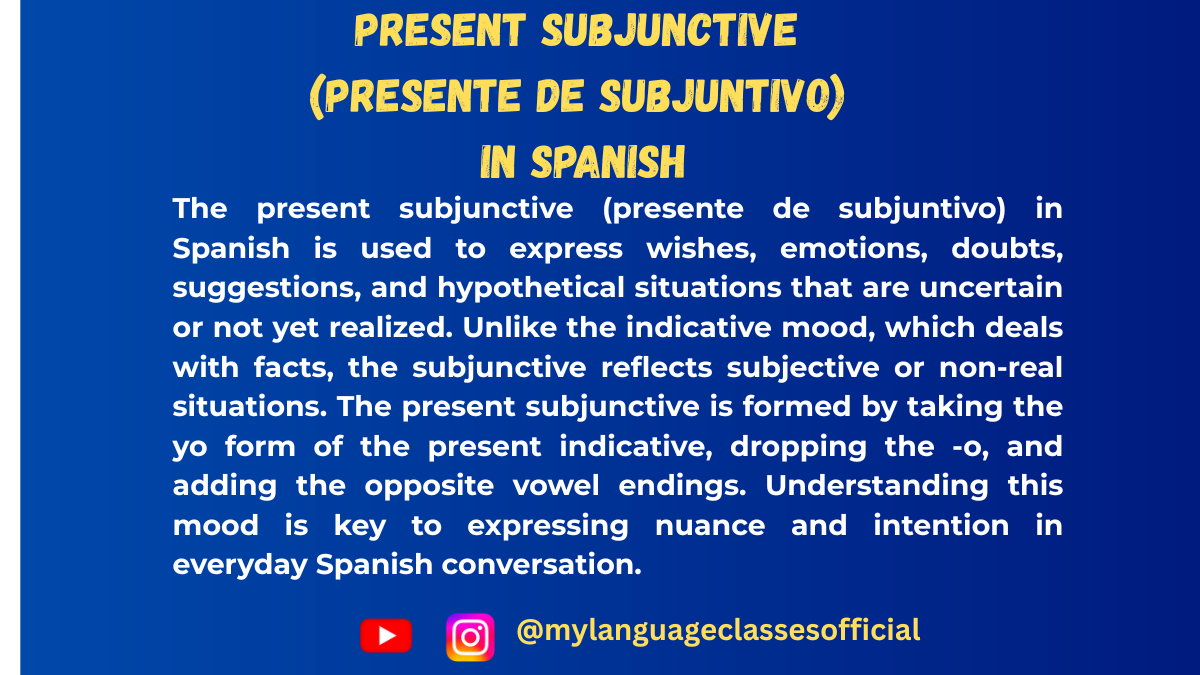
Present Subjunctive (Presente de Subjuntivo) in Spanish
Understanding the Present Subjunctive (Presente de Subjuntivo) in Spanish
The Present Subjunctive (Presente de Subjuntivo) is a crucial concept in Spanish that expresses doubt, wishes, emotions, and subjective perceptions. Unlike the indicative, which is used for facts and certainty, the subjunctive emphasizes what is hypothetical, uncertain, or emotionally influenced.
Situations Where the Presente de Subjuntivo Is Used
- Expressions of Desire or Influence
Used when one person wants another person to do something.- Trigger Phrases: “Quiero que,” “Deseo que,” “Prefiero que.”
- Example:
- Indicative: Quiero aprender español. (I want to learn Spanish.)
- Subjunctive: Quiero que tú aprendas español. (I want you to learn Spanish.)
- Expressions of Doubt or Denial
Used with uncertainty or disbelief.- Trigger Phrases: “Dudo que,” “No creo que,” “Es posible que.”
- Example:
- Dudo que ella venga a la fiesta. (I doubt that she will come to the party.)
- Emotions and Reactions
Used to express feelings about actions or situations.- Trigger Phrases: “Me alegra que,” “Siento que,” “Temo que.”
- Example:
- Me alegra que tú estés aquí. (I’m glad you’re here.)
- Impersonal Expressions of Uncertainty or Emotion
When impersonal phrases signal subjectivity or uncertainty.- Trigger Phrases: “Es importante que,” “Es necesario que,” “Es increíble que.”
- Example:
- Es importante que estudiemos para el examen. (It’s important that we study for the exam.)
- Conjunctions That Express Future Uncertainty
Subjunctive is used after certain conjunctions if the action is uncertain or hasn’t occurred yet.- Trigger Conjunctions: “Para que,” “A menos que,” “Antes de que.”
- Example:
- Te lo explico para que lo entiendas. (I’ll explain it so you understand.)
- Negative Commands
For giving instructions to not do something.- Example:
- No hables con él. (Don’t talk to him.)
- Example:
Conjugating Verbs in the Presente de Subjuntivo
To conjugate regular verbs in the Present Subjunctive, follow these steps:
- Start with the first-person singular (yo) form of the verb in the present indicative.
- Remove the “-o” ending.
- Add the appropriate subjunctive ending based on the verb’s group (-AR, -ER, -IR).
Endings for Regular Verbs
Verb Group Yo Tú Él/Ella/Usted Nosotros/Nosotras Vosotros/Vosotras Ellos/Ellas/Ustedes -AR -e -es -e -emos -éis -en -ER -a -as -a -amos -áis -an -IR -a -as -a -amos -áis -an Examples of Regular Verbs
- Hablar (to speak)
- yo hable, tú hables, él/ella/usted hable, nosotros/nosotras hablemos, vosotros/vosotras habléis, ellos/ellas/ustedes hablen.
- Comer (to eat)
- yo coma, tú comas, él/ella/usted coma, nosotros/nosotras comamos, vosotros/vosotras comáis, ellos/ellas/ustedes coman.
- Vivir (to live)
- yo viva, tú vivas, él/ella/usted viva, nosotros/nosotras vivamos, vosotros/vosotras viváis, ellos/ellas/ustedes vivan.
Irregular Verbs in the Presente de Subjuntivo
Certain verbs are irregular in the Present Subjunctive and do not follow the standard rules. Below is a table of commonly used irregular verbs with their conjugations.
Verb Yo Tú Él/Ella/Usted Nosotros/Nosotras Vosotros/Vosotras Ellos/Ellas/Ustedes Ser sea seas sea seamos seáis sean Ir vaya vayas vaya vayamos vayáis vayan Estar esté estés esté estemos estéis estén Saber sepa sepas sepa sepamos sepáis sepan Haber haya hayas haya hayamos hayáis hayan Dar dé des dé demos deis den Ver vea veas vea veamos veáis vean
Important Tips for Using the Presente de Subjuntivo
- Check for Triggers: The subjunctive is rarely used alone. Look for expressions that require it.
- Mind the Gender and Plurality: Match adjectives and nouns appropriately in gender (masculine/feminine) and number (singular/plural).
- Example: Es importante que las estudiantes estén preparadas.
- Distinguish Context: Ensure you use the subjunctive only when necessary to avoid confusion with the indicative.
- Practice Common Phrases: Memorize phrases where the subjunctive is frequently used to internalize its application.
By mastering the Presente de Subjuntivo, you open the door to expressing more nuanced thoughts and emotions in Spanish. Practice regularly, and don’t hesitate to use examples as guides in your learning journey. ¡Buena suerte!
If you found this guide helpful, I’d love to hear from you! Share your thoughts in the comments below or connect with me on social media. For more tips, resources, and inspiration, visit my blog at mylanguageclasses.in. Follow on Instagram and subscribe on YouTube
📚 Continue Learning Spanish
- Expressions of Desire or Influence
-
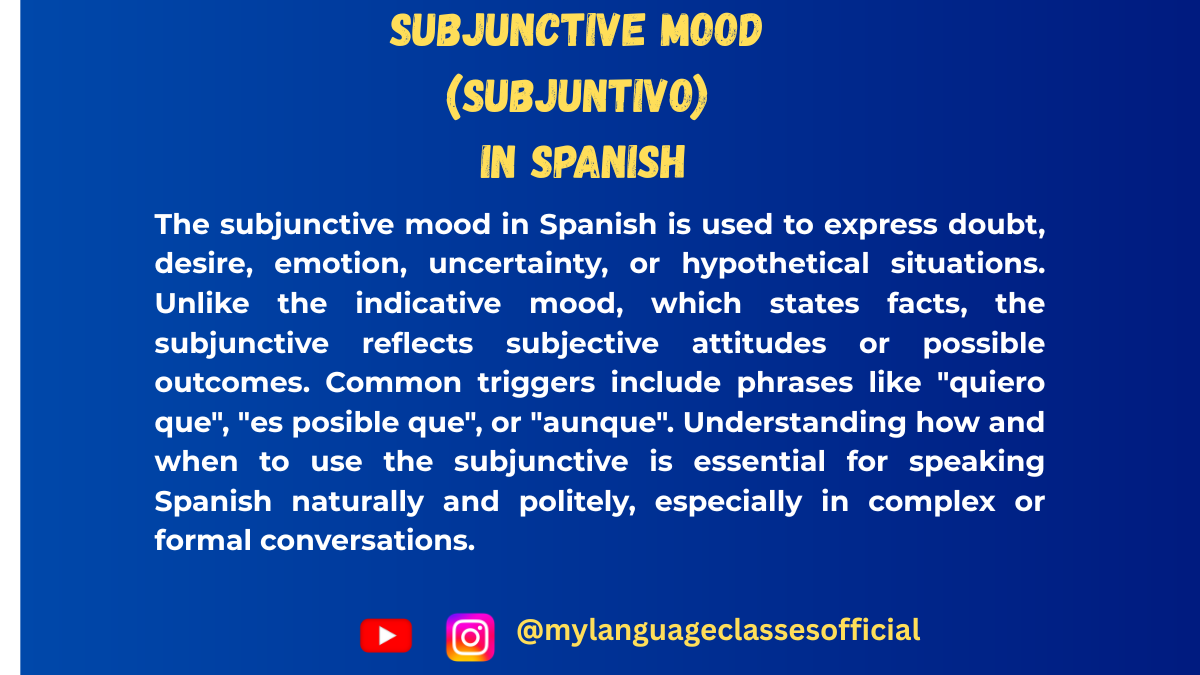
Subjunctive Mood in Spanish
Understanding the Subjunctive Mood in Spanish
The subjunctive mood is one of the most challenging yet fascinating aspects of Spanish for learners. Unlike the indicative mood, which deals with facts, realities, and concrete statements, the subjunctive is used to express uncertainty, subjectivity, emotions, desires, hypothetical situations, and more. Mastering when to use the subjunctive mood is essential for sounding natural and fluent in Spanish.
Key Characteristics of the Subjunctive Mood
- Subjectivity and Uncertainty The subjunctive mood is used when the speaker expresses doubt, uncertainty, or subjectivity. It contrasts with the indicative, which conveys certainty and objective facts.
- Dependent on Context Subjunctive verbs often appear in subordinate clauses introduced by conjunctions like que (that). The verb in the main clause typically triggers the subjunctive in the subordinate clause.
Situations Where the Subjunctive Mood is Used
1. Wishes, Desires, and Requests
Use the subjunctive when expressing a wish or desire about someone or something else. Common verbs that trigger this usage include querer (to want), esperar (to hope), and desear (to wish).
- Example:
- Indicative: Quiero que tú vienes. (Incorrect)
- Subjunctive: Quiero que tú vengas. (I want you to come.)
Note: The subject in the main clause is different from the subject in the subordinate clause.
2. Emotions
When expressing feelings such as joy, sadness, surprise, or fear about something, the subjunctive is used.
- Example:
- Indicative: Me alegra que tienes tiempo. (Incorrect)
- Subjunctive: Me alegra que tengas tiempo. (I’m glad you have time.)
3. Doubt and Denial
The subjunctive is required when there is doubt, denial, or disbelief about an action or state. Verbs like dudar (to doubt) and negar (to deny) often signal this.
- Example:
- Indicative: Dudo que es verdad. (Incorrect)
- Subjunctive: Dudo que sea verdad. (I doubt it is true.)
Note: If there is no doubt, use the indicative:
- No dudo que es verdad. (I don’t doubt it’s true.)
4. Impersonal Expressions
Certain impersonal expressions followed by que require the subjunctive. These include expressions of necessity, possibility, or subjective judgment.
- Common expressions:
- Es importante que… (It’s important that…)
- Es posible que… (It’s possible that…)
- Es extraño que… (It’s strange that…)
- Example:
- Indicative: Es posible que él tiene razón. (Incorrect)
- Subjunctive: Es posible que él tenga razón. (It’s possible he’s right.)
5. Hypothetical Situations
Use the subjunctive to describe hypothetical or non-existent situations, especially in sentences starting with si (if).
- Example:
- Subjunctive: Si tuviera dinero, viajaría más. (If I had money, I would travel more.)
6. Conjunctions of Contingency and Purpose
The subjunctive follows certain conjunctions that imply purpose, condition, or a future action. These include:
- para que (so that)
- a menos que (unless)
- antes de que (before)
- Example:
- Indicative: Estudio para que puedo aprender. (Incorrect)
- Subjunctive: Estudio para que pueda aprender. (I study so that I can learn.)
7. Unrealized Actions
Use the subjunctive when the action hasn’t yet been completed or is anticipated.
- Example:
- Indicative: Cuando llegas, hablamos. (Incorrect)
- Subjunctive: Cuando llegues, hablaremos. (When you arrive, we’ll talk.)
Subjunctive vs. Indicative: A Quick Comparison
Indicative Subjunctive Expresses certainty and facts. Expresses doubt, subjectivity, or uncertainty. Example: Sé que él viene. (I know he’s coming.) Example: No creo que él venga. (I don’t think he’s coming.)
Gender, Articles, and Agreement in Subjunctive Sentences
- Articles: Use definite articles (el, la, los, las) when referring to something specific and indefinite articles (un, una, unos, unas) for non-specific references.
- Example: Es importante que el profesor explique bien.
- Gender and Plurality: Adjectives and nouns in the subjunctive sentence must agree in gender and number.
- Example: Es raro que las niñas estén calladas. (It’s strange that the girls are quiet.)
- Pronoun Placement: Pronouns like me, te, lo, la, nos, os, los, las must be placed correctly depending on verb forms in subjunctive sentences.
Things to Keep in Mind
- Always pay attention to the trigger verb or expression in the main clause.
- The subjunctive is usually required when there’s a change in subject between clauses.
- Don’t confuse formal subjunctive structures with casual, everyday Spanish, which might omit the subjunctive in informal speech.
By understanding the situations where the subjunctive mood is required and practicing it in real-life contexts, you’ll be able to express yourself more naturally in Spanish. Remember, the subjunctive isn’t just a grammar rule—it’s a way of capturing the nuances of emotions, possibilities, and perspectives in communication!
If you found this guide helpful, I’d love to hear from you! Share your thoughts in the comments below or connect with me on social media. For more tips, resources, and inspiration, visit my blog at mylanguageclasses.in. Follow on Instagram and subscribe on YouTube
📚 Continue Learning Spanish
-

Present Perfect Tense (Pretérito Perfecto de Indicativo) in Spanish
Present Perfect Tense (Pretérito Perfecto de Indicativo) in Spanish
The Pretérito Perfecto de Indicativo is a crucial tense in Spanish, used to describe actions or events that are connected to the present or have relevance to it. In English, it corresponds to the Present Perfect tense (e.g., “I have eaten”).
What is the Pretérito Perfecto de Indicativo?
The Pretérito Perfecto is used to describe:
- Actions that happened in the recent past and are relevant now.
- Hoy he estudiado mucho.
(Today I have studied a lot.)
- Hoy he estudiado mucho.
- Experiences or actions that have occurred at some point in life without specifying when.
- ¿Alguna vez has viajado a España?
(Have you ever traveled to Spain?)
- ¿Alguna vez has viajado a España?
- Actions within a time frame that has not yet ended (this week, this month, etc.).
- Esta semana hemos ido al cine dos veces.
(This week we have gone to the movies twice.)
- Esta semana hemos ido al cine dos veces.
- Unfinished past actions or those seen as having ongoing effects in the present.
- He vivido en Madrid durante tres años.
(I have lived in Madrid for three years.)
- He vivido en Madrid durante tres años.
How to Form the Pretérito Perfecto de Indicativo
This tense is formed with the present tense of the auxiliary verb “haber” + the past participle of the main verb.
1. Conjugation of “Haber” (to have)
This verb acts as an auxiliary verb in this tense. Below is its conjugation:
Subject Conjugation of Haber Yo he Tú has Él/Ella/Usted ha Nosotros/as hemos Vosotros/as habéis Ellos/Ellas/Ustedes han 2. Formation of the Past Participle
To form the past participle:
- For -AR verbs: Replace -ar with -ado.
- Hablar → Hablado (spoken)
- For -ER/-IR verbs: Replace -er/-ir with -ido.
- Comer → Comido (eaten)
- Vivir → Vivido (lived)
Irregular Past Participles:
Many verbs have irregular past participles. Here are some common ones:
Verb Past Participle English Abrir Abierto Opened Decir Dicho Said Escribir Escrito Written Hacer Hecho Done/Made Ver Visto Seen Volver Vuelto Returned Poner Puesto Put Romper Roto Broken
Common Expressions Using the Pretérito Perfecto
These phrases are frequently used with the Pretérito Perfecto to provide a context for the action:
- Hoy – Today
- Hoy he terminado el informe.
(Today I have finished the report.)
- Hoy he terminado el informe.
- Esta semana – This week
- Esta semana hemos tenido muchas reuniones.
(This week we have had many meetings.)
- Esta semana hemos tenido muchas reuniones.
- Alguna vez – Ever
- ¿Alguna vez has probado el sushi?
(Have you ever tried sushi?)
- ¿Alguna vez has probado el sushi?
- Nunca – Never
- Nunca he estado en Italia.
(I have never been to Italy.)
- Nunca he estado en Italia.
- Ya – Already
- Ya hemos hecho la tarea.
(We have already done the homework.)
- Ya hemos hecho la tarea.
- Todavía no – Not yet
- Todavía no han llegado.
(They have not arrived yet.)
- Todavía no han llegado.
- Recientemente – Recently
- Recientemente he leído un libro interesante.
(I have recently read an interesting book.)
- Recientemente he leído un libro interesante.
Key Grammar Rules and Considerations
- Gender and Number Agreement
The past participle does not change to agree with the subject because it is part of a compound tense.- Ellos han comido.
(They have eaten.) - Ella ha comido.
(She has eaten.)
- Ellos han comido.
- Object Pronouns
Object pronouns are placed before “haber.”- Me he levantado temprano.
(I have gotten up early.) - Nos hemos perdido en la ciudad.
(We have gotten lost in the city.)
- Me he levantado temprano.
- Negative Sentences
Place “no” before “haber.”- No he terminado el proyecto.
(I have not finished the project.)
- No he terminado el proyecto.
Conjugation Examples for Regular Verbs
1. -AR Verbs: Hablar (to speak)
Subject Conjugation Example Sentence Yo he hablado He hablado con mi amigo. Tú has hablado ¿Has hablado con ella? Él/Ella/Usted ha hablado Ha hablado mucho hoy. Nosotros/as hemos hablado Hemos hablado del problema. Vosotros/as habéis hablado Habéis hablado demasiado. Ellos/Ellas/Uds. han hablado Han hablado con el profesor. 2. -ER Verbs: Comer (to eat)
Subject Conjugation Example Sentence Yo he comido He comido pasta hoy. Tú has comido ¿Has comido algo? Él/Ella/Usted ha comido Ha comido en el restaurante. Nosotros/as hemos comido Hemos comido juntos. Vosotros/as habéis comido Habéis comido temprano. Ellos/Ellas/Uds. han comido Han comido mucho. 3. -IR Verbs: Vivir (to live)
Subject Conjugation Example Sentence Yo he vivido He vivido en Barcelona. Tú has vivido ¿Has vivido aquí mucho tiempo? Él/Ella/Usted ha vivido Ha vivido en muchas ciudades. Nosotros/as hemos vivido Hemos vivido cerca del mar. Vosotros/as habéis vivido Habéis vivido en España. Ellos/Ellas/Uds. han vivido Han vivido experiencias únicas.
Practice Exercises
- Conjugate these verbs in Pretérito Perfecto:
- Escribir
- Leer
- Decidir
- Volver
- Translate the following sentences into Spanish:
- I have never traveled to Mexico.
- They have opened the door.
- Have you seen the movie?
Conclusion
The Pretérito Perfecto de Indicativo is an indispensable tense for discussing past actions with present relevance. With consistent practice and attention to detail, you’ll be able to master its formation and usage effortlessly. ¡Buena suerte!
If you found this guide helpful, I’d love to hear from you! Share your thoughts in the comments below or connect with me on social media. For more tips, resources, and inspiration, visit my blog at mylanguageclasses.in. Follow on Instagram and subscribe on YouTube
📚 Continue Learning Spanish
- Actions that happened in the recent past and are relevant now.
-
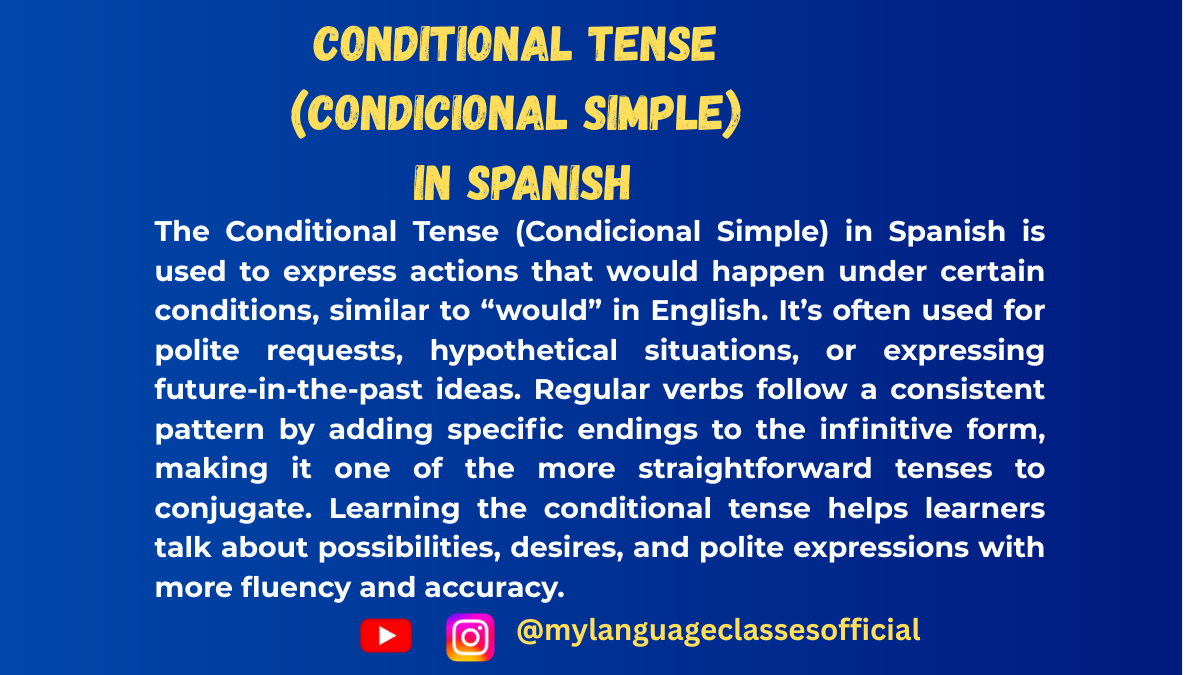
Spanish Conditional Tense (Condicional Simple)
Spanish Conditional Tense (Condicional Simple)
The Conditional tense in Spanish, also known as Condicional Simple, is essential for expressing hypothetical situations, polite requests, advice, or possibilities. It is equivalent to “would” in English and plays a crucial role in day-to-day conversations.
Situations Where Conditional Tense is Used
- Hypothetical Situations
Express unreal or imagined scenarios.
Example:- Si tuviera dinero, viajaría por el mundo.
(If I had money, I would travel the world.)
- Si tuviera dinero, viajaría por el mundo.
- Polite Requests
Used to make polite or formal requests.
Example:- ¿Podrías ayudarme con esto?
(Could you help me with this?)
- ¿Podrías ayudarme con esto?
- Suggestions and Advice
To give recommendations in a softer tone.
Example:- Yo que tú, estudiaría más.
(If I were you, I would study more.)
- Yo que tú, estudiaría más.
- Expressing Desires or Wishes
When talking about what one would like.
Example:- Me gustaría aprender a bailar salsa.
(I would like to learn how to dance salsa.)
- Me gustaría aprender a bailar salsa.
- Future in the Past
When talking about a future action from the perspective of the past.
Example:- Dijo que llamaría después.
(He said he would call later.)
- Dijo que llamaría después.
How to Form the Conditional Tense
1. Regular Verbs
The Conditional tense for regular verbs is formed by adding specific endings to the infinitive form of the verb. These endings are the same for all three conjugations (-ar, -er, -ir).
Endings:
-ía, -ías, -ía, -íamos, -íais, -ían
Examples:
- Hablar (to talk)
- Yo hablaría (I would talk)
- Tú hablarías (You would talk)
- Él/Ella/Usted hablaría (He/She/You would talk)
- Nosotros hablaríamos (We would talk)
- Vosotros hablaríais (You all would talk)
- Ellos/Ellas/Ustedes hablarían (They/You all would talk)
- Comer (to eat)
- Yo comería (I would eat)
- Vivir (to live)
- Yo viviría (I would live)
2. Irregular Verbs
Irregular verbs in the Conditional tense have stem changes, but they use the same endings as regular verbs.
Common Irregular Verbs:
Infinitive Stem Change Conditional Form Example Tener Tendr- Tendría (I would have) Poder Podr- Podría (I could) Venir Vendr- Vendría (I would come) Decir Dir- Diría (I would say) Hacer Har- Haría (I would do/make) Querer Querr- Querría (I would want) Saber Sabr- Sabría (I would know)
Common Expressions in Conditional Tense
- Polite Phrases:
- ¿Podrías ayudarme? (Could you help me?)
- Me encantaría ir contigo. (I would love to go with you.)
- Suggestions:
- Deberías estudiar más. (You should study more.)
- Yo que tú, lo haría. (If I were you, I would do it.)
- Hypotheticals:
- Si fuera rico, viajaría mucho. (If I were rich, I would travel a lot.)
- ¿Qué harías en mi lugar? (What would you do in my place?)
- Future in the Past:
- Ella prometió que vendría temprano. (She promised she would come early.)
Key Considerations:
- Articles and Gender:
Ensure agreement between articles and nouns:- El coche sería rápido. (The car would be fast.)
- La casa estaría lista. (The house would be ready.)
- Plurality:
Match subjects and verbs in number:- Singular: Ella diría. (She would say.)
- Plural: Ellos dirían. (They would say.)
Practice Sentences
- Si tuviera más tiempo, leería más libros.
(If I had more time, I would read more books.) - Nos encantaría visitar España algún día.
(We would love to visit Spain someday.) - ¿Qué harías si ganaras la lotería?
(What would you do if you won the lottery?) - Yo en tu lugar, hablaría con el jefe.
(If I were you, I would talk to the boss.)
Mastering the Conditional tense in Spanish opens up a world of nuanced expression. With practice, you’ll be able to convey politeness, share hypotheticals, and provide advice effortlessly!
If you found this guide helpful, I’d love to hear from you! Share your thoughts in the comments below or connect with me on social media. For more tips, resources, and inspiration, visit my blog at mylanguageclasses.in. Follow on Instagram and subscribe on YouTube
📚 Continue Learning Spanish
- Hypothetical Situations
-
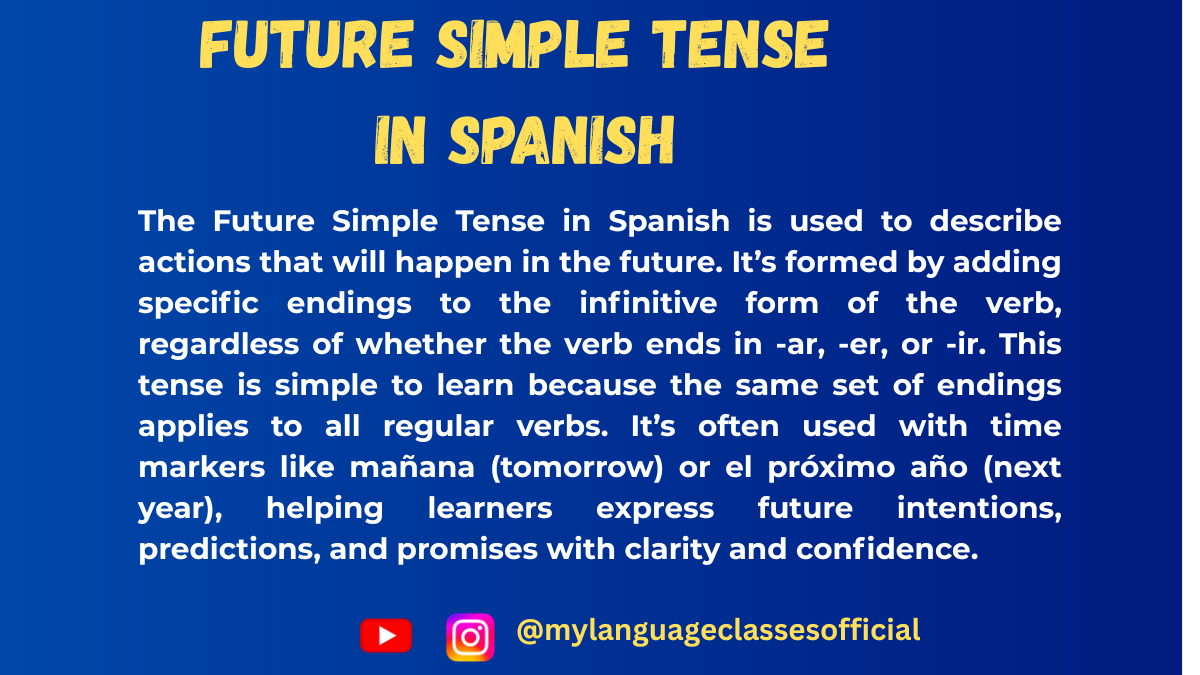
Future Simple Tense in Spanish (Futuro Simple)
Future Simple Tense in Spanish
The Future Simple tense in Spanish is used to talk about actions or events that will happen in the future. It’s an essential tense for expressing plans, predictions, promises, or possibilities. Here, we’ll explore how to form the Future Simple tense, its applications, common verbs, and expressions used in everyday life.
Situations Where the Future Simple Tense is Used
- Expressing Intentions or Plans
- Example: Mañana visitaré a mi abuela.
(Tomorrow, I will visit my grandmother.)
- Example: Mañana visitaré a mi abuela.
- Making Predictions
- Example: Lloverá esta tarde.
(It will rain this afternoon.)
- Example: Lloverá esta tarde.
- Expressing Assumptions or Guesses
- Example: ¿Quién será a la puerta?
(Who might be at the door?)
- Example: ¿Quién será a la puerta?
- Giving Commands in a Polite Way
- Example: Abrirás el libro en la página diez.
(You will open the book on page ten.)
- Example: Abrirás el libro en la página diez.
- Expressing Promises or Determination
- Example: Te llamaré más tarde.
(I will call you later.)
- Example: Te llamaré más tarde.
Forming the Future Simple Tense
In Spanish, the Future Simple tense is formed by adding specific endings to the infinitive form of the verb. The endings are the same for -ar, -er, and -ir verbs.
Regular Verbs
- Endings:
-é, -ás, -á, -emos, -éis, -án
Examples with Regular Verbs:
- Hablar (to talk)
- Yo hablaré (I will talk)
- Tú hablarás (You will talk)
- Él/Ella/Usted hablará (He/She/You formal will talk)
- Nosotros hablaremos (We will talk)
- Vosotros hablaréis (You all will talk)
- Ellos/Ellas/Ustedes hablarán (They/You all formal will talk)
- Comer (to eat)
- Yo comeré (I will eat)
- Tú comerás (You will eat)
- Él/Ella/Usted comerá (He/She/You formal will eat)
- Nosotros comeremos (We will eat)
- Vosotros comeréis (You all will eat)
- Ellos/Ellas/Ustedes comerán (They/You all formal will eat)
- Vivir (to live)
- Yo viviré (I will live)
- Tú vivirás (You will live)
- Él/Ella/Usted vivirá (He/She/You formal will live)
- Nosotros viviremos (We will live)
- Vosotros viviréis (You all will live)
- Ellos/Ellas/Ustedes vivirán (They/You all formal will live)
Irregular Verbs
Some verbs have irregular stems in the Future Simple tense but use the same endings. Here’s a list of common irregular verbs:
Infinitive Stem Example Sentence Tener (to have) Tendr- Tendré dinero mañana. (I will have money tomorrow.) Hacer (to do/make) Har- Harás los deberes. (You will do the homework.) Poder (to be able to) Podr- Podremos ir al cine. (We will be able to go to the cinema.) Decir (to say/tell) Dir- Dirán la verdad. (They will tell the truth.) Salir (to leave) Saldr- Saldré temprano. (I will leave early.) Venir (to come) Vendr- Vendrás a mi casa. (You will come to my house.) Saber (to know) Sabr- Sabrá la respuesta. (He/She will know the answer.) Poner (to put) Pondr- Pondremos la mesa. (We will set the table.) Querer (to want) Querr- Querrán un helado. (They will want ice cream.)
Daily Expressions Using the Future Simple Tense
Here are common expressions with their meanings and example sentences:
- ¿Qué harás mañana?
(What will you do tomorrow?)- Example: Estudiaré para el examen. (I will study for the exam.)
- Todo saldrá bien.
(Everything will be fine.)- Example: No te preocupes, todo saldrá bien. (Don’t worry, everything will be fine.)
- Nos veremos pronto.
(We will see each other soon.)- Example: Nos veremos el sábado. (We will see each other on Saturday.)
- Será un día largo.
(It will be a long day.)- Example: Mañana será un día largo en el trabajo. (Tomorrow will be a long day at work.)
- Lo haré luego.
(I will do it later.)- Example: No te preocupes, lo haré luego. (Don’t worry, I’ll do it later.)
Things to Keep in Mind
- Articles and Gender:
Use definite (el, la, los, las) or indefinite (un, una, unos, unas) articles depending on the noun. Ensure they match in gender and number.- El coche será mío. (The car will be mine.)
- Las flores estarán listas. (The flowers will be ready.)
- Pronoun Placement:
When using pronouns, ensure they are appropriately placed with conjugated verbs.- Example: Me lo dirás mañana. (You will tell me tomorrow.)
- Reflexive Verbs:
Reflexive verbs retain their reflexive pronouns in the Future Simple tense.- Example: Me despertaré temprano. (I will wake up early.)
Practice Makes Perfect!
To master the Future Simple tense, practice forming sentences with regular and irregular verbs. Engage in daily conversations using common expressions, and don’t hesitate to make predictions, promises, or guesses in Spanish!
If you found this guide helpful, I’d love to hear from you! Share your thoughts in the comments below or connect with me on social media. For more tips, resources, and inspiration, visit my blog at mylanguageclasses.in. Follow on Instagram and subscribe on YouTube
📚 Continue Learning Spanish
- Expressing Intentions or Plans
-
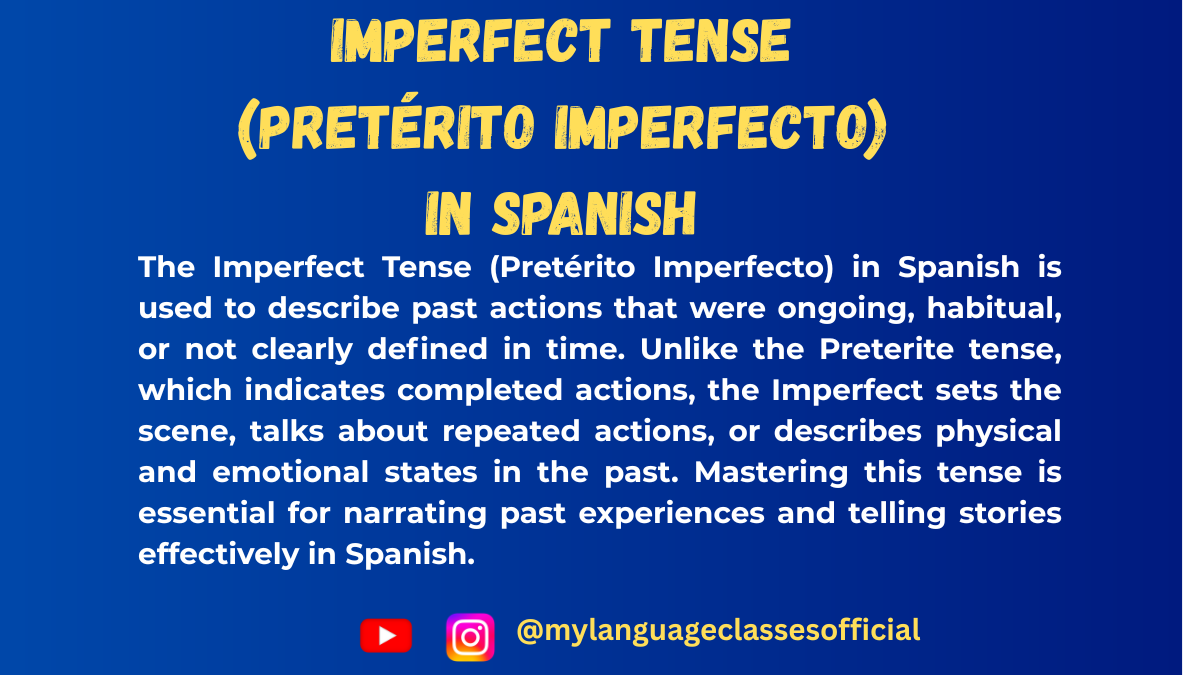
Imperfect Tense (Pretérito Imperfecto) in Spanish
Imperfect Tense (Pretérito Imperfecto)
The Pretérito Imperfecto is one of the past tenses in Spanish, used to describe habitual actions, ongoing events, and situations in the past. It provides context or background without indicating when the action specifically started or ended. Below, we’ll explore its use, conjugation for regular and irregular verbs, and common expressions.
When Do We Use the Pretérito Imperfecto?
- Describing habitual or repeated actions in the past
- Example: Cuando era niño, jugaba al fútbol todos los días.
(When I was a child, I played soccer every day.)
- Example: Cuando era niño, jugaba al fútbol todos los días.
- Setting the scene or providing background information
- Example: Hacía frío y nevaba cuando llegué a casa.
(It was cold, and it was snowing when I arrived home.)
- Example: Hacía frío y nevaba cuando llegué a casa.
- Describing mental states, emotions, or physical conditions in the past
- Example: Estaba cansado después del trabajo.
(I was tired after work.)
- Example: Estaba cansado después del trabajo.
- Actions that were in progress in the past (without focusing on their start or end)
- Example: Leía un libro mientras ella cocinaba.
(I was reading a book while she was cooking.)
- Example: Leía un libro mientras ella cocinaba.
- Telling time and age in the past
- Example: Eran las cinco de la tarde.
(It was five in the afternoon.)
Tenía veinte años en ese momento.
(I was twenty years old at that time.)
- Example: Eran las cinco de la tarde.
Forming the Pretérito Imperfecto
The conjugation of regular verbs in the imperfect tense follows specific patterns for each verb group: -ar, -er, and -ir.
Regular Verbs
- -AR VerbsSubjectEndingExample (hablar)Yo-abahablabaTú-abashablabasÉl/Ella-abahablabaNosotros-ábamoshablábamosVosotros-abaishablabaisEllos-abanhablaban
- -ER VerbsSubjectEndingExample (comer)Yo-íacomíaTú-íascomíasÉl/Ella-íacomíaNosotros-íamoscomíamosVosotros-íaiscomíaisEllos-íancomían
- -IR Verbs
Conjugation is identical to -er verbs.- Example: vivir
vivía, vivías, vivía, vivíamos, vivíais, vivían
- Example: vivir
Key Irregular Verbs in the Pretérito Imperfecto
- Ir (to go)
- Iba, ibas, iba, íbamos, ibais, iban
- Ser (to be)
- Era, eras, era, éramos, erais, eran
- Ver (to see)
- Veía, veías, veía, veíamos, veíais, veían
Things to Keep in Mind
- Articles and Gender: When describing objects or actions, make sure articles (el, la, los, las) match the noun’s gender and number. For example:
- El sol brillaba. (The sun was shining.)
- Las estrellas iluminaban el cielo. (The stars lit up the sky.)
- Context and Time Expressions: Words like siempre (always), a menudo (often), cuando era niño/a (when I was a child), mientras (while), and todos los días (every day) are often used with the imperfect tense.
Common Expressions with Pretérito Imperfecto
- Cuando era niño/a – When I was a child
- Cuando era niña, me encantaba jugar con muñecas.
(When I was a little girl, I loved playing with dolls.)
- Cuando era niña, me encantaba jugar con muñecas.
- Todos los días – Every day
- Todos los días iba a la escuela a pie.
(Every day I walked to school.)
- Todos los días iba a la escuela a pie.
- Siempre – Always
- Siempre veía la televisión después de la cena.
(I always watched TV after dinner.)
- Siempre veía la televisión después de la cena.
- A menudo – Often
- A menudo visitábamos a nuestros abuelos los domingos.
(We often visited our grandparents on Sundays.)
- A menudo visitábamos a nuestros abuelos los domingos.
- Mientras – While
- Mientras ella cocinaba, él ponía la mesa.
(While she was cooking, he was setting the table.)
- Mientras ella cocinaba, él ponía la mesa.
Common Verbs in Pretérito Imperfecto with Examples
- Hablar (to talk)
- Yo hablaba con mis amigos cada tarde.
(I used to talk with my friends every afternoon.)
- Yo hablaba con mis amigos cada tarde.
- Comer (to eat)
- Nosotros comíamos juntos todos los sábados.
(We ate together every Saturday.)
- Nosotros comíamos juntos todos los sábados.
- Vivir (to live)
- Ellos vivían en Madrid en los años 90.
(They lived in Madrid in the 90s.)
- Ellos vivían en Madrid en los años 90.
- Estar (to be)
- Él estaba feliz en esa época.
(He was happy at that time.)
- Él estaba feliz en esa época.
- Leer (to read)
- Ella leía un libro cuando la llamé.
(She was reading a book when I called her.)
- Ella leía un libro cuando la llamé.
The Pretérito Imperfecto is a versatile tense that captures the nuances of the past in Spanish. By practicing its conjugation, understanding its context, and incorporating common expressions, you’ll master its use in no time!
If you found this guide helpful, I’d love to hear from you! Share your thoughts in the comments below or connect with me on social media. For more tips, resources, and inspiration, visit my blog at mylanguageclasses.in. Follow on Instagram and subscribe on YouTube
📚 Continue Learning Spanish
- Describing habitual or repeated actions in the past
-
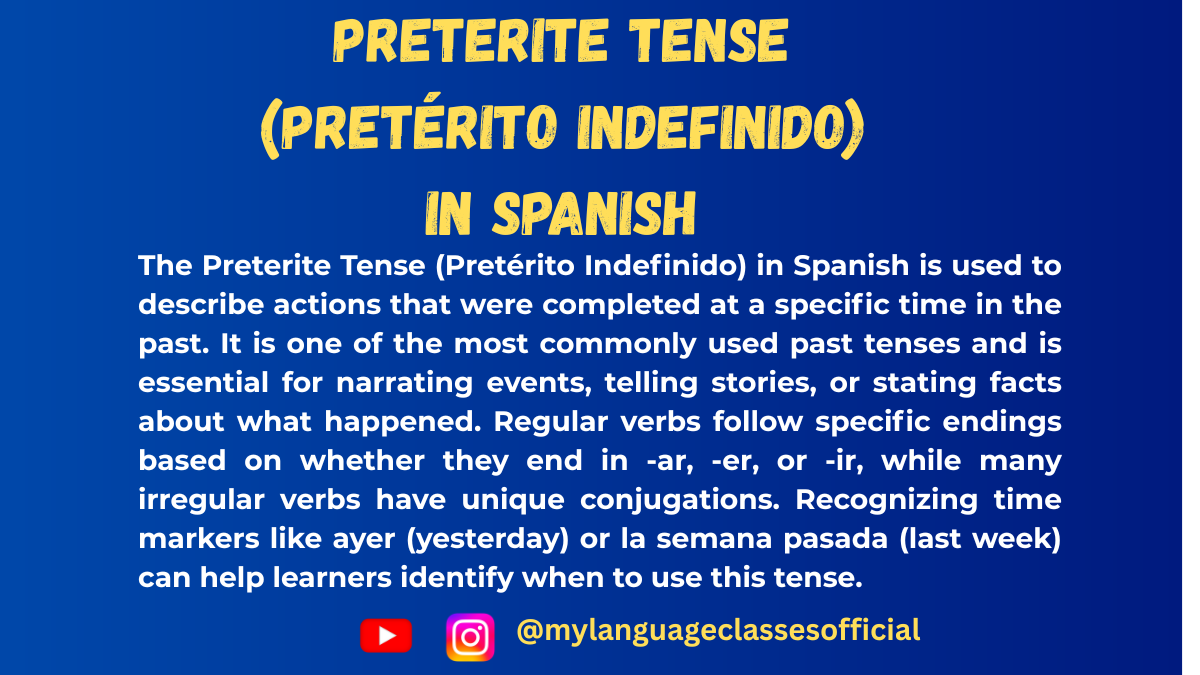
Preterite Tense (Pretérito Indefinido) in Spanish
Preterite Tense (Pretérito Indefinido) in Spanish
The Preterite tense, or Pretérito Indefinido, is one of the most common past tenses in Spanish. It’s primarily used to describe actions that were completed in the past. In this blog, we will dive deep into understanding its usage, formation, and some practical expressions to help you speak like a native.
When to Use the Preterite Tense
The Preterite is used in several specific situations:
- Completed actions in the past
Actions that are seen as finished and are not ongoing.
Example:- Ayer leí un libro. (Yesterday I read a book.)
- Actions with a clear beginning or end
Events that started and ended at a specific time.
Example:- Llegué a casa a las 8. (I arrived home at 8.)
- Sequential actions
Events that happened one after the other.
Example:- Me levanté, me duché y salí a correr. (I got up, showered, and went for a run.)
- Interrupting actions
When one action interrupts another ongoing action.
Example:- Estudiaba cuando sonó el teléfono. (I was studying when the phone rang.)
Forming the Preterite Tense
The Preterite tense has different conjugation rules for -AR, -ER, and -IR regular verbs.
Regular Verb Conjugation
- -AR Verbs
Replace the infinitive ending-arwith:- é, aste, ó, amos, asteis, aron
- Yo hablé (I spoke)
- Tú hablaste (You spoke)
- Él/Ella/Usted habló (He/She/You spoke)
- Nosotros/as hablamos (We spoke)
- Vosotros/as hablasteis (You all spoke)
- Ellos/Ellas/Ustedes hablaron (They/You all spoke)
- -ER Verbs
Replace the infinitive ending-erwith:- í, iste, ió, imos, isteis, ieron
- Yo comí (I ate)
- Tú comiste (You ate)
- Él/Ella/Usted comió (He/She/You ate)
- Nosotros/as comimos (We ate)
- Vosotros/as comisteis (You all ate)
- Ellos/Ellas/Ustedes comieron (They/You all ate)
- -IR Verbs
Replace the infinitive ending-irwith the same endings as-erverbs:- í, iste, ió, imos, isteis, ieron
- Yo viví (I lived)
- Tú viviste (You lived)
- Él/Ella/Usted vivió (He/She/You lived)
- Nosotros/as vivimos (We lived)
- Vosotros/as vivisteis (You all lived)
- Ellos/Ellas/Ustedes vivieron (They/You all lived)
Common Irregular Verbs in Preterite
Some verbs have irregular stems and endings in the Preterite. These do not follow the standard conjugation rules.
List of Common Irregular Verbs
- Ser/Ir (to be/to go): fui, fuiste, fue, fuimos, fuisteis, fueron
- Hacer (to do/make): hice, hiciste, hizo, hicimos, hicisteis, hicieron
- Estar (to be): estuve, estuviste, estuvo, estuvimos, estuvisteis, estuvieron
- Tener (to have): tuve, tuviste, tuvo, tuvimos, tuvisteis, tuvieron
- Poder (to be able to): pude, pudiste, pudo, pudimos, pudisteis, pudieron
- Decir (to say): dije, dijiste, dijo, dijimos, dijisteis, dijeron
Common Expressions with Preterite Tense
Here’s a list of expressions often used with the Preterite tense, along with their meanings and examples:
- Ayer (Yesterday)
- Example: Ayer fuimos al cine. (Yesterday we went to the cinema.)
- Anoche (Last night)
- Example: Anoche cené con mis amigos. (Last night I had dinner with my friends.)
- El año pasado (Last year)
- Example: El año pasado viajé a España. (Last year I traveled to Spain.)
- Hace un mes (A month ago)
- Example: Hace un mes terminé el curso. (A month ago I finished the course.)
- La semana pasada (Last week)
- Example: La semana pasada trabajé mucho. (Last week I worked a lot.)
- De repente (Suddenly)
- Example: De repente empezó a llover. (Suddenly it started to rain.)
- Una vez (Once)
- Example: Una vez conocí a un famoso. (Once I met a celebrity.)
Things to Keep in Mind
- Gender and Plurality
While verbs in the Preterite tense are not affected by gender or plurality, the articles and adjectives around them should agree with the noun.- Example:
- El niño habló. (The boy spoke.)
- La niña habló. (The girl spoke.)
- Example:
- Irregularities and Spelling Changes
- Verbs ending in
-car,-gar, and-zarhave spelling changes in the yo form:- Buscar → busqué
- Pagar → pagué
- Almorzar → almorcé
- Verbs ending in
- Pronunciation Tips
- Stress is crucial in the Preterite tense. For example:
- Caminó (He/She walked) vs. Camino (Road).
- Stress is crucial in the Preterite tense. For example:
Practice Makes Perfect!
Learning the Preterite tense requires practice. Try forming sentences using both regular and irregular verbs. Use the common expressions listed above to describe past events, and soon, you’ll find it much easier to recall these forms naturally.
If you found this guide helpful, I’d love to hear from you! Share your thoughts in the comments below or connect with me on social media. For more tips, resources, and inspiration, visit my blog at mylanguageclasses.in. Follow on Instagram and subscribe on YouTube
📚 Continue Learning Spanish
- Completed actions in the past

